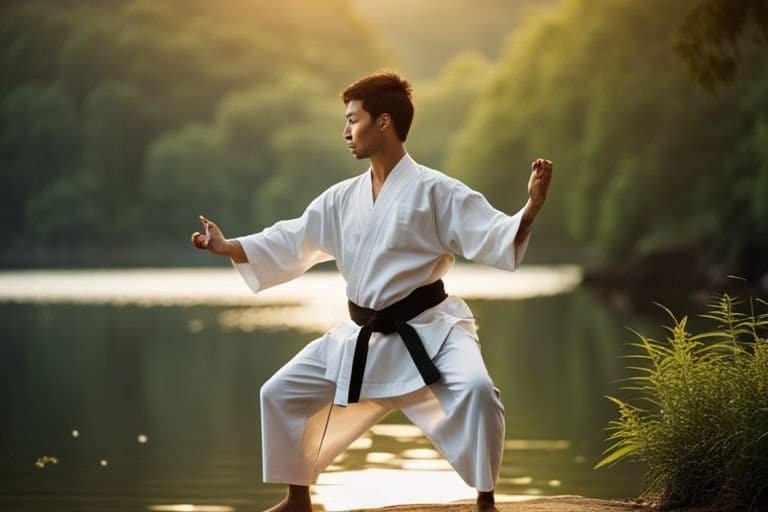Renowned for its physical demands and mental discipline, martial arts plays an integral role in achieving overall wellness. From improved physical fitness and self-defence skills to enhanced mental focus and self-confidence, the practice of martial arts offers a multitude of benefits that contribute to a person’s well-being. Beyond the physical and mental advantages, engaging in martial arts also fosters discipline and emotional resilience, enabling individuals to navigate the challenges of daily life with strength and grace. Furthermore, the community and camaraderie found in martial arts academies can create a supportive environment that enhances one’s overall mental and emotional health. Thus, the role of martial arts in overall wellness cannot be overstated, making it a valuable pursuit for those seeking holistic health and fitness.
Key Takeaways:
- Martial arts can promote physical fitness and health: Engaging in martial arts activities such as karate, judo, or taekwondo can improve cardiovascular health, build muscle strength, and enhance flexibility and agility.
- Martial arts contribute to mental well-being: Practising martial arts can help reduce stress, improve focus and concentration, and boost self-confidence and self-discipline.
- Martial arts can promote overall wellness: The combination of physical and mental benefits from participating in martial arts can contribute to a well-rounded sense of wellness and balance in life.

Historical Context of Martial Arts in Wellness
The role of martial arts in overall wellness has a rich historical context that dates back centuries. Throughout history, martial arts have been recognised for their positive impact on mental and physical well-being. In fact, there are numerous documented accounts of martial arts being used as a form of therapy and self-care.
For instance, martial arts have played a significant role in promoting mental health and emotional well-being. The practice of martial arts has been found to reduce stress, anxiety, and depression, while also improving mood, self-esteem, and overall psychological well-being. According to Top 5 Benefits of Martial Arts for Mental Health, martial arts training can lead to enhanced mental resilience and improved coping skills.
Origin of Various Martial Arts Forms
The origin of different martial arts forms is deeply rooted in the history and culture of various regions around the world. From the powerful strikes of Muay Thai in Thailand to the graceful movements of Tai Chi in China, each martial art form has a unique heritage coupled with specific principles and philosophy. These forms have evolved over time through centuries of practice, discipline, and refinement, making them integral to the culture and identity of their respective origins.
Martial Arts as Traditional Forms of Healing
Martial arts have also been recognised as traditional forms of healing in many cultures. In ancient times, martial arts were not only practised for self-defence but also for their therapeutic benefits. The physical movements and breathing techniques involved in martial arts were often used to treat various ailments, promote overall well-being, and cultivate a harmonious balance between the body and the mind.
Moreover, the deep-rooted philosophy of martial arts emphasises the connection between physical health, mental clarity, and spiritual alignment. This holistic approach has made martial arts an enduring and revered practice for achieving overall wellness.
Physical Health Benefits of Martial Arts
Enhancement of Cardiovascular Health
Martial arts training involves a significant amount of cardiovascular exercise, from intense sparring sessions to high-energy forms and routines. This constant movement and elevated heart rate leads to improvements in cardiovascular health. The sustained aerobic activity helps strengthen the heart, improve blood circulation, and lower the risk of heart disease. Additionally, the combination of quick bursts of energy followed by periods of lower intensity can enhance the body’s ability to use oxygen effectively, leading to overall better cardiovascular endurance.
Improvement in Strength, Flexibility, and Balance
Engaging in martial arts provides a comprehensive workout for the entire body, resulting in improvements in strength, flexibility, and balance. The various kicks, punches, and stances involved in martial arts require practitioners to engage multiple muscle groups, leading to overall strength improvement. Furthermore, the fluid and dynamic movements in martial arts routines contribute to enhanced flexibility and improved balance. These physical benefits are advantageous not only in martial arts practice but also in daily activities, reducing the risk of injuries and enhancing overall physical performance.
Moreover, the disciplined training in martial arts encourages individuals to push their physical boundaries, leading to incremental improvements in strength, flexibility, and balance over time. This consistent honing of physical abilities contributes to a holistic approach to fitness and wellness.
Weight Management
Martial arts training offers a holistic approach to weight management, combining cardiovascular exercise, strength training, and flexibility routines to promote a healthy body composition. The high-intensity nature of martial arts practice contributes to calorie burning and fat loss, leading to weight management and improved body composition. Additionally, the muscle-building aspect of martial arts training increases the body’s metabolic rate, facilitating weight control and maintenance in the long term.
The combination of physical activity, mindful eating habits, and the discipline cultivated through martial arts practice creates a sustainable approach to weight management, promoting overall wellness and a healthier lifestyle.

Mental and Emotional Wellness Through Martial Arts
Martial arts can have a profound impact on mental and emotional wellness, offering a range of benefits that contribute to overall well-being. According to WebMD, engaging in martial arts can lead to numerous mental benefits.
Stress Reduction and Mental Clarity
One of the key benefits of martial arts is the ability to reduce stress and achieve mental clarity. The focused and disciplined nature of martial arts training allows practitioners to release built-up tension and quiet the mind. This not only promotes a sense of calm and relaxation but also enhances mental focus and concentration. The meditative aspects of certain martial arts disciplines can help individuals manage stress and find clarity in their thoughts.
Martial arts also provide a healthy outlet for expressing and channelling emotions, allowing individuals to process and release negative feelings in a constructive way. Through regular practice, practitioners can develop a greater awareness of their emotional state, leading to improved emotional regulation and resilience.
Building Self-Esteem and Confidence
Another significant aspect of martial arts is its capacity to build self-esteem and confidence. As individuals progress in their training and overcome challenges, they experience a sense of accomplishment and self-worth. The structured and goal-oriented nature of martial arts fosters a supportive environment where practitioners can develop resilience and belief in their abilities.
Martial arts training also instils a sense of empowerment and self-assurance, as individuals learn valuable self-defence skills and gain a deeper understanding of their physical and mental capabilities. This newfound confidence can positively impact various aspects of a person’s life, contributing to a more positive self-image and greater assertiveness in facing challenges.
Furthermore, the sense of belonging to a martial arts community and the support received from instructors and peers can have a profound impact on an individual’s self-esteem and confidence. The encouragement and camaraderie within the martial arts environment contribute to a positive and nurturing atmosphere for personal growth.
The Role of Martial Arts in Cultivating Discipline and Focus
Martial arts play a crucial role in cultivating discipline and focus, essential skills that are valuable both in training and daily life. The structured training regimens and adherence to martial arts principles require practitioners to develop a strong sense of discipline. This discipline extends to various aspects of life, promoting responsible and consistent behaviour.
Through rigorous training and the pursuit of mastery, individuals learn the importance of perseverance and dedication. This not only contributes to personal growth but also enhances the ability to set and achieve goals, fostering a sense of purpose and direction. Additionally, the emphasis on focus and attention to detail in martial arts training can translate to improved concentration and attentiveness in other areas of life, such as work or study.
The Social Aspect of Martial Arts in Wellness
Participating in martial arts goes beyond just physical exercise; it also encompasses a social aspect that contributes significantly to overall wellness. The social aspects of martial arts encompass fostering community and support networks, as well as developing respect and understanding across cultures.
Fostering Community and Support Networks
One of the key benefits of engaging in martial arts for overall wellness is the sense of community it fosters. Martial arts classes often create a supportive environment where individuals come together with a shared interest in self-improvement and learning. This sense of community can provide a strong support network, fostering a feeling of belonging and connection that is essential for mental and emotional well-being.
Developing Respect and Understanding Across Cultures
Another significant social aspect of martial arts in wellness is its role in developing respect and understanding across cultures. Martial arts, originating from various countries such as China, Japan, Korea, and Brazil, provide an opportunity for individuals to engage with diverse cultural traditions and values. Through training and interacting with practitioners from different backgrounds, martial arts promote respect, empathy, and cultural awareness, contributing to a more open and inclusive society.
Engaging in martial arts allows individuals to develop a deep appreciation for the cultural significance of different martial arts practices, while also fostering a greater understanding of the cultural heritage and traditions associated with each discipline.
Integration of Martial Arts into Daily Wellness Routines
Martial arts can be a valuable addition to your daily wellness routines, providing a holistic approach to physical and mental well-being. By incorporating martial arts into your daily habits, you can experience a range of benefits that contribute to overall wellness.
Recommendations for Beginners
For those new to martial arts, it’s essential to start slowly and focus on mastering the fundamental techniques. Beginners should seek guidance from experienced instructors to ensure proper form and reduce the risk of injury. Additionally, setting realistic goals and being consistent with practice can help build a solid foundation in martial arts. It’s important to listen to your body and allow for adequate rest and recovery between sessions. As you progress, gradually increase the intensity and complexity of your training to continue challenging your body and mind.
Balancing Martial Arts with Other Wellness Practices
While martial arts offer numerous benefits, it’s crucial to strike a balance with other wellness practices such as yoga, meditation, and strength training to achieve overall harmony. Integrating different wellness practices can prevent burnout and overtraining while promoting a well-rounded approach to health. Each discipline complements the others, promoting flexibility, strength, endurance, and mindfulness. By incorporating a variety of wellness practices, individuals can maximise the positive effects on their physical and mental well-being.
Remember, balance is key when it comes to integrating martial arts with other wellness practices. It’s important to listen to your body and adjust your routine accordingly to avoid overexertion or neglecting other aspects of wellness. By finding the right combination that works for you, you can experience the full spectrum of benefits that martial arts and other wellness practices have to offer.
What Is the Role of Martial Arts in Overall Wellness?
Martial arts play a vital role in overall wellness by offering a holistic approach to physical fitness, mental well-being, and emotional balance. Through the practice of martial arts, individuals can improve their strength, flexibility, cardiovascular health, and endurance, leading to the physical benefits of martial arts. Moreover, martial arts training fosters mental discipline, focus, and resilience, which can have a positive impact on stress management and self-confidence. The emphasis on self-defence techniques and mindfulness also contributes to an individual’s sense of safety and empowerment. Overall, the multifaceted nature of martial arts makes it an invaluable tool for achieving holistic wellness and personal growth.
FAQ
Q: What is the role of martial arts in overall wellness?
A: Martial arts plays a crucial role in overall wellness by promoting physical fitness, mental discipline, self-defence skills, and stress reduction. It also fosters a sense of community and belonging.
Q: How does martial arts contribute to physical fitness?
A: Martial arts training involves a combination of strength, flexibility, and cardiovascular exercises, leading to improved endurance, balance, agility, and muscle tone.
Q: What mental benefits does martial arts offer?
A: Martial arts cultivate mental discipline, focus, and resilience. It also enhances self-confidence, patience, and the ability to stay calm under pressure.
Q: Can martial arts be used for self-defence?
A: Yes, martial arts equips individuals with practical self-defence skills and the confidence to protect themselves in threatening situations.
Q: How does martial arts help in stress reduction?
A: Engaging in martial arts provides a healthy outlet to release stress, frustration, and tension. The mindfulness and breathing techniques incorporated in martial arts also contribute to stress reduction.



